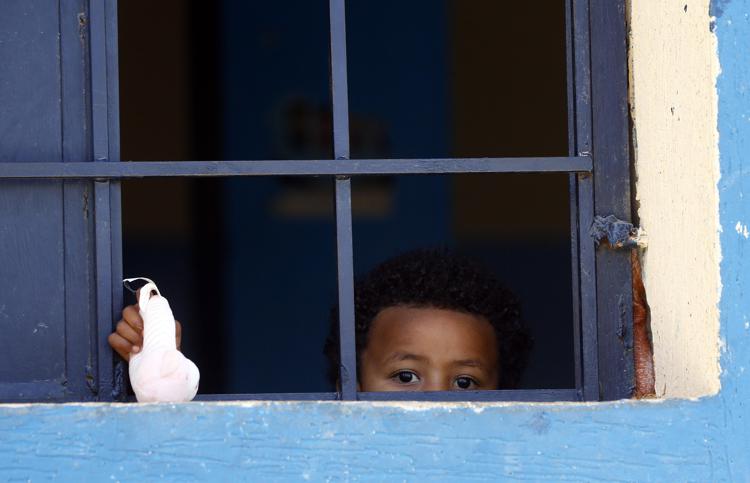

Millions of refugees across Africa face hunger and malnourishment due to severe funding shortages, conflict and disasters as well as the economic impact of the COVID19 pandemic, the United Nations warned on Thursday.
“Millions of refugees throughout Africa are currently reliant on regular aid to meet their food needs,” said Filippo Grandi, UN High Commissioner for Refugees.
“Around half are children, who may develop life-long difficulties if deprived of food at vital stages in their development," Grandi noted.
Unless urgent action is taken to address the situation, levels of acute malnutrition, stunting and anaemia are expected to rise, UNHCR and WFP warned in a joint statement.
In refugee camps in Ethiopia, 62% of children are experiencing critical levels of anaemia, the statement said.
“While the situation continues to deteriorate for everyone, the disaster is magnified for refugees who have absolutely nothing to cushion their fall,” said WFP Executive Director, David Beasley.
“In the best of times, refugees live in cramped conditions, struggle to meet their basic needs and often have no option but to rely on outside assistance for their survival. Now more than ever, they need our lifesaving support.”
WFP is helping feed more than 10 million refugees worldwide, including those in the world’s largest refugee settlements, such as Bidibidi in Uganda, where rations were slashed by 30% in April due to inadequate funding, the statement noted.
Refugee populations who were previously able to feed and fend for themselves, including many living in urban areas and those working in the informal economy, are also facing "significant challenges", said the statement.
Many refugees have lost their only source of income as work possibilities disappeared due to COVID-19 prevention measures. Most are not covered by social protection schemes, leaving many families destitute and dependent on aid. In South Africa, many refugees are in danger of being evicted and have approached UNHCR helplines in desperate need of food and support.
At the same time, import and export restrictions are squeezing supply chains. In the mostly landlocked Sahel region, COVID-19 prevention measures such as border closures and movement restrictions make it harder to transport produce.
Meanwhile escalating insecurity, violence and conflict in the Sahel - as well as climate change and poverty - have disrupted food security and livelihoods for millions of people.
Assistance for more than 1.2 million refugees and other highly vulnerable groups in the Sahel needs to be sustained, the statement said.
In Cameroon, WFP was forced to halve its assistance to refugees from the Central African Republic in May and June due to funding gaps. On the basis of current funding levels, it will have to stop cash assistance entirely from August.
Ration cuts are also expected for Nigerian refugees in the country from July, according to the statement.
Across East Africa, unstandardized health measures at multiple borders have created congestion, delaying vital aid and trade flows. Lack of recognition of test results in neighbouring countries and the requirement to wait for test results have caused long queues and delays at custom points, the statement stressed.
COVID-19-induced transport delays have negatively impacted food prepositioning in South Sudan ahead of the rainy season, requiring WFP to work extra hard to keep roads open during the rains, with an increased risk of having to resort to extremely expensive air operations should overland options cease to be viable.
In many parts of the continent, food prices are rising, posing a potentially devastating threat to millions of refugees, particularly those who were already living hand-to-mouth on daily wages, warned the statement.
In the Republic of Congo, the average price of a basic food basket has increased by 15% while in Rwanda, WFP market monitoring around refugee camps found food prices were already on average 27% higher in April 2020 compared to last year, and 40% higher than in 2018.
As a result of these challenges, many refugees are resorting to "negative coping mechanisms", such as skipping meals or reducing meal portions. More than 80% of refugees in South Sudan are estimated to be resorting to such measures. In some cases, refugees are resorting to begging, prostitution or early or forced marriages to be able to buy food, the statement added..
UNHCR and WFP are concerned about the negative impact of reduced assistance on refugees and urge donors in the international community to provide further funding to ensure refugees do not face starvation. WFP needs around 694 million dollars is for its life-saving operations in Africa from July to December, while UNHCR is requesting 227 million.
The agencies urged African governments to ensure refugees and displaced populations are included in social safety nets and COVID-19 response plans, in line with commitments to the UN's Global Compact on Refugees blueprint to guarantee access food and emergency cash assistance.